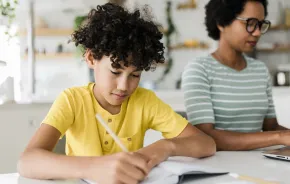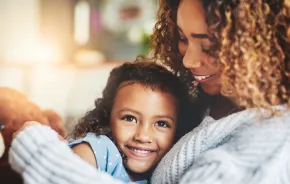Anyone who's ever seen an infant coo, smile or reach out realizes we're social animals from day one.
As the months go by, a baby's interaction increases as he looks to his
parents for approval, engages them in play and insists upon their
(nearly constant) presence.
By toddlerhood, he learns something about sharing, as he begins to
communicate his needs and wishes and starts to play with other children.
Educators hope that by the time a child begins school, those
fundamental social skills will evolve and develop enough to enable him
to take turns, cooperate, respect others and form friendships.
The goal? That in kindergarten, kids will begin successfully navigating
their social world-an essential skill that should help them hold their
own in the classroom and throughout their lives.
"Learning to live comfortably in the company of peers is a necessary
requirement for your child, a critical challenge that begins at a very
early age and will continue for many years," child development expert
Kenneth Rubin says in his book, The Friendship Factor.
It is a skill directly linked to later academic success, says Jamila
Reid, clinical psychologist at the University of Washington Parenting
Clinic. "Can the child share? Recognize a peer's intentions? Listen to
the teacher's instruction? Those things are as important as reading,
letters and numbers."
Don't underestimate the impact friendships can have on children, says
Terry Hollinsworth, a child and family therapist. "Social acceptance
has a huge bearing on a child's sense of self--and it transfers into
the classroom. It's hard to concentrate when you're miserable."
Collaborative learning
Educators today are putting more and more emphasis upon the importance
of learning collaboratively, says Leslie Fields, counselor for Redmond
Elementary School in the Lake Washington School District.
"Collaborative learning goes on all through school; children must
prepare for that." Kindergarten, she says, provides a natural setting
for teaching the collaborative process.
With a little help from parents, much of that learning can happen
before kindergarten. "Parents should give their young children plenty
of opportunities to play with other kids," says Fields. "They can talk
to them about listening to the other side, about how to play fair, and
about letting others go first in line."
Often, says Rubin in The Friendship Factor, parents don't view social
competence as a learned skill. But kids become socially adept the same
way they develop an understanding of math and science-through
"exploring by trial and error, working out problems...and through
building knowledge step by step, all with the help of friends and wise
and responsive adults," he writes.
What else can parents do to help foster their children's social
know-how? Here are some suggestions from Reid and Fields:
-
Model behavior by role-playing with puppets and dolls: "My puppet is
sad because someone wouldn't give him the block. What should he do?" - Praise your child's efforts at sharing: "I'm going to share this toy with you. Great, you just shared that with me!"
- Have children over for play dates.
- Talk about how hurtful it is to be teased.
- Play board games to reinforce how to play fair.
- Give children vocabulary that will help them get what they want instead of hitting or shoving.
-
Give children vocabulary that will help them understand emotions and
feelings-and emphasize the positive: "You're excited!" "You're happy!" - Label acts such as helping, sharing and trading, so kids begin to know what those behaviors are.
-
Talk through potential situations and offer solutions: "What happens if
you're second and not first?" "What do you have to do to make a friend?"
Preschool age children have a window of opportunity to begin learning
how to live in the company of others, says Hollinsworth. "It's a huge
developmental task," she notes. "It is a time things are learned for
life."
Linda Morgan writes frequently on education issues for ParentMap.









